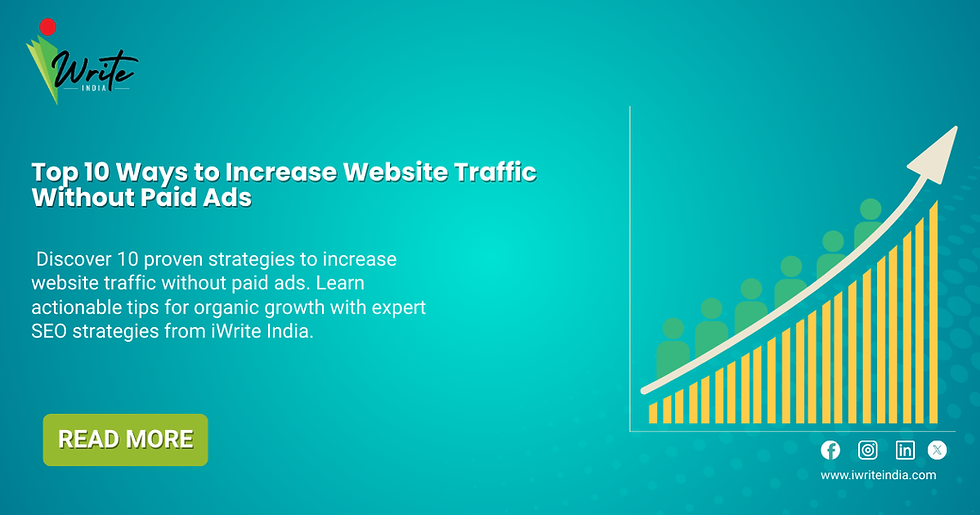On-Page SEO: How to Optimize for Robots and Readers
- iWrite India
- Jul 31
- 4 min read

Did you know that 68% of online experiences begin with a search engine, and over 53% of website traffic comes from organic search (BrightEdge, 2025)? This makes On-Page SEO more crucial than ever. If your website is not optimized for both search engines and readers, you risk losing visibility, clicks, and conversions.
This guide is crafted by a Google and digital presence expert to help you understand On-Page SEO, align it with SEO for Google, and ensure your website satisfies both algorithms and human readers. Whether you're a business owner or seeking SEO services in Delhi, these strategies can help you rise above competitors in 2025.
Quick Checklist for Perfect On-Page SEO
Use one primary keyword naturally in title, URL, meta description, and first 100 words.
Maintain content readability with short paragraphs, bullet points, and subheadings.
Optimize images with descriptive alt text and compressed size.
Add internal and external links for context and authority.
Write for humans first, then fine-tune for SEO for Google crawlers.
Ensure fast loading speed and mobile-friendly design.
1. Understand On-Page SEO Basics
On-Page SEO refers to optimizing individual web pages to rank higher in search engines and attract qualified traffic. It covers content quality, keyword placement, technical setup, and user experience. Google's algorithms analyze over 200 ranking factors, making SEO optimization a blend of science and art.
Key elements include:
Meta titles and descriptions
URL structure
Keyword usage and density
Content depth and relevance
Internal linking and site navigation
2. Conduct Keyword Research the Right Way
Keyword research is the foundation of On-Page SEO. Tools like SEMrush, Ahrefs, and Google Keyword Planner can help you identify target phrases. Remember to:
Choose keywords with high search volume and low difficulty
Focus on SEO for Google but avoid keyword stuffing
Use semantic keywords for natural flow
Statistics show that long-tail keywords drive 70% of organic traffic, meaning detailed, specific queries convert better than broad terms.
3. Create Content That Delivers Value
Google’s algorithm prioritizes E-E-A-T (Experience, Expertise, Authoritativeness, Trustworthiness). Your content must not just include keywords but offer actionable insights.
Write in a friendly, conversational tone that engages readers.
Structure content with H2/H3 headings for easy scanning.
Ensure every piece solves a user’s problem, enhancing SEO optimization naturally.
Add FAQs and data points to boost credibility.
Well-optimized content can increase dwell time by 35%, signaling relevance to Google.
4. Optimize for Technical Factors
Even high-quality content fails if technical On-Page SEO is ignored.
Use clean, descriptive URLs
Optimize images for faster load times
Add schema markup for rich snippets
Ensure mobile responsiveness since over 60% of searches come from mobile devices
If you’re looking for SEO services in Delhi, ensure your chosen digital marketing agency in Delhi has strong technical expertise to handle these areas.
5. Link Building Inside Your Website
Internal links help both Google crawlers and readers navigate your website. For example:
Link to related blogs to keep users engaged
Use descriptive anchor texts that include your On-Page SEO keywords
Update old pages to maintain freshness
Effective internal linking can boost rankings by up to 40% for target keywords.
6. Track and Refine Your On-Page SEO
Optimization is not a one-time task. Use tools like Google Search Console and Analytics to:
Monitor bounce rates and click-through rates
Identify pages with high impressions but low clicks
Continuously test headlines, meta descriptions, and CTAs
Brands investing in consistent SEO optimization see 3x more organic traffic growth over 12 months compared to static pages.
Make On-Page SEO Work for You
Mastering On-Page SEO is about balancing technical precision with human-friendly content. When executed well, it builds authority, drives organic traffic, and increases conversions. Whether you're a small business or seeking SEO services in Delhi, the right digital marketing agency in Delhi can help you achieve long-term success in search rankings.
Partner with iWrite India to Master On-Page SEO
Looking to supercharge your website’s visibility with expert On-Page SEO strategies? At iWrite India, we craft SEO-optimized content and technical enhancements that rank you higher on Google and connect you with your audience effectively. Get a tailored SEO optimization plan designed for your niche today.
5 Unique FAQs About On-Page SEO
1. How often should I update my website for better On-Page SEO?
Websites with fresh content updated every 2–3 months perform better because Google prioritizes relevance and recent information.
2. Does On-Page SEO work without backlinks?
Yes, optimized pages can rank without backlinks for low-competition keywords, but combining both increases long-term visibility.
3. What is the ideal keyword density for On-Page SEO?
Aim for 1–2% density for the primary keyword to avoid over-optimization while keeping content natural and readable.
4. Can AI-generated content hurt my On-Page SEO?
Yes, if AI content lacks originality or intent match, it may trigger Google’s helpful content updates and lower rankings.
5. How does site speed impact On-Page SEO?
A 1-second delay in page load time can reduce conversions by 7%, and Google considers site speed a direct ranking factor.




![Top 5 Digital Marketing Agencies in Delhi [2025 Updated]](https://static.wixstatic.com/media/53afe3_a718f2b4f3ae4a75becb77146127a742~mv2.png/v1/fill/w_980,h_515,al_c,q_90,usm_0.66_1.00_0.01,enc_avif,quality_auto/53afe3_a718f2b4f3ae4a75becb77146127a742~mv2.png)

Comments